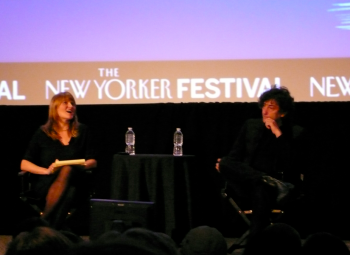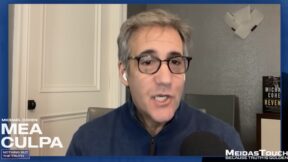Dispatches From The New Yorker Festival
Author Neil Gaiman
interviewed by Dana Goodyear
 Neil Gaiman, the comic book, children’s book and fantasy novelist, challenged Goodyear’s classification of him as “prolific.” “I don’t think of myself as being a prolific writer because I know prolific writers. Terry Pratchett has only written 5 novels since being diagnosed with Alzheimer’s. That’s prolific.” Dana started by immediately calling out all the fangirls in the audience, “This man doesn’t need an introduction as there are probably many more people here who know more about his life and works than me, and I think I know quite a lot.”
Neil Gaiman, the comic book, children’s book and fantasy novelist, challenged Goodyear’s classification of him as “prolific.” “I don’t think of myself as being a prolific writer because I know prolific writers. Terry Pratchett has only written 5 novels since being diagnosed with Alzheimer’s. That’s prolific.” Dana started by immediately calling out all the fangirls in the audience, “This man doesn’t need an introduction as there are probably many more people here who know more about his life and works than me, and I think I know quite a lot.”
Though almost all the audience questions were about Dr. Who and the Sandman series, exposing the crowd as the Comic Con group, most of the time was spent talking about Coraline and and his children’s books that verge on terror. His daughter Holly who, by all accounts is now a well-rounded, sunny, 25-year-old, “from birth to the age of 13 was Wednesday Adams. At a certain point I sat her down and said, ‘You’re going to be hanging in someone’s basement, being all gothy with your gothy friends and smoking clove cigarrettes. They’ll all be complaining about how awful their parents are and when they get to you, they’re all going to want my autograph. This doesn’t end well for you.'”
Holly would crawl into Gaiman’s lap and dictate stories that involved babies getting kidnapped and mothers disappearing, getting trapped in dark spaces and evil monsters. “I sent them to a few friends who wrote back, ‘these are really creepy.’ In order to sate her appetite I went into the local bookstore asking after good horror stories for five-year-olds to be told that such things didn’t exist, so I had to write them myself.” Coraline wouldn’t have been published at all if it weren’t for Morgan, the daughter of his agent. “Read it to your children, If they are scared and traumatized, we won’t try to publish it,” he told his agent, when she expressed reservations about the first half of the story. A decade later, Gaiman had mentioned to Morgan that Coraline wouldn’t have been published without her letting her mother know it wasn’t too scary, just to have her respond that she actually thought it was terrifying, but that she wanted to know how it would end and knew that if she told her mother that it was too scary that she’d never find out.
His novel, American Gods, came about after he’d moved to Minnesota from England. “There were so many things that were weird to me that were normal to them, like the fact that winter can kill you. I’d say, ‘This is odd, do you people not know this is odd?’ In England winter is rainy and you make yourself a cup of tea. In Minnesota you can’t leave the house without getting frostbite.” He loved the thoughts of Gods falling down to Earth, “having to make their way, just like the rest of us.” He wants to write a big American Gods second book.
Gaiman drove across the U.S. to research for American Gods, stopping in small cities, driving through abandoned towns in rural areas, which was a change for him, “In England, you can’t drive long distances, you run out of country.” Goodyear brought up Gaiman’s driving, which is such that Gaiman’s wife at the time insisted on driving herself to the hospital when she was giving birth to their first child. “I drive according to the pace of the music, it is my soundtrack. I drive slower when the beat is slower, which doesn’t always suit other people on the road.”
The comic book start was rocky for Gaiman. “We met the editor at the comic’s offices, which was actually the phone company office of the editor’s former job at the phone company, from which he’d been fired but still had a key.” He acknowledges that the longevity of the Sandman series sometimes surprises him, “It’s weird to see a person with a Sandman tattoo who was born long after the first books were published, or to meet a young adult whose parents met in line at a Sandman signing.” He didn’t want the series to continue without him but he understood the brand belonged to DC Comics. “I started to suggest that if DC were to continue to run Sandman without me, that I’d never work with them again. These weren’t even veiled threats.” Needless to say, the threats worked.
Audience questions were Dr. Who driven, especially after Goodyear pleaded for someone to ask him about it since she’d run out of time herself. He couldn’t say much about it but did talk about how torturous it was to know he was writing an episode, kept having people talk about how he should write it or get angry that he wasn’t writing it, and still had to keep silent on the issue. The episode should run around Easter 2011 and his one giveaway was that there is a character Idris, played by Suranne Jones, who is an old acquaintance of Dr. Who but has a new face. Groans ensued from the tortured fans. Gaiman was a huge Dr. Who fan himself and talked about how several of his earliest memories include scenes from the show as he watched it as a boy. “There was an episode I can remember watching from my grandmother’s house, there were huge alien ants called Zarbi. I have made a very adult choice to not buy and re-watch that episode because I know watching it now, would ruin the magic. To see how poorly made the costumes, the way they bump into the cameraman by accident.” He wants to preserve the memory, few would blame him.
This is an opinion piece. The views expressed in this article are those of just the author.





Comments
↓ Scroll down for comments ↓